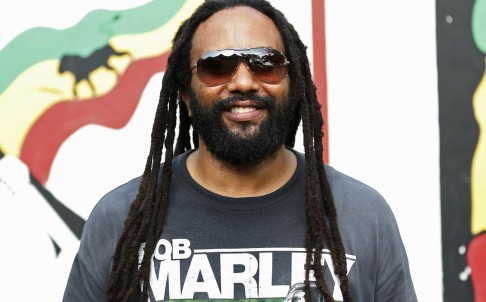US court rules in favour of Bob Marley's family in T-shirt dispute
US court sides with the estate in ruling firm's use of reggae legend's image violated the law
PUBLISHED : Monday, 23 February, 2015, 1:24am
UPDATED : Monday, 23 February, 2015, 1:24am
Agence France-Presse in New York

Ky-Mani Marley's T-shirt honours his father.Photo: Reuters
A US court has sided with Bob Marley's family, which sued a company that sold shirts depicting the reggae legend, in a case that has potential ramifications for merchandise of other deceased stars.
The estate of the Jamaican icon had filed a suit after low-cost T-shirts featuring a photo of a speaking Marley next to the yellow, green and red colours associated with his Rastafarian faith had gone on sale at Walmart and Target stores and some other major US retailers.
A jury in the western state of Nevada in 2011 awarded more than US$2 million in damages and legal fees to firms owned by Marley's children that said they had lost an order to sell T-shirts at Walmart stores as the unauthorised rival was distributing a similar product. The defendants lodged an appeal that was rejected on Friday by a federal court, which agreed that the non-family companies violated the 1946 Lanham Act, a key US law on copyright infringement.
The court, which heard a survey of 509 customers at a shopping mall, agreed that the T-shirts could create an impression that Marley had endorsed them.
"This case presents a question that is familiar in our circuit: when does the use of a celebrity's likeness or persona in connection with a product constitute false endorsement that is actionable under the Lanham Act?" asked Judge Norman Randy Smith of the US Court of Appeals for the Ninth Circuit, which is based in San Francisco with jurisdiction across the west coast.
"We conclude that the evidence presented at trial was sufficient for a jury to find defendants violated the Lanham Act by using Marley's likeness."
The accused company, called A.V.E.L.A., had said recognising such an argument for a dead person would essentially create a federal right of publicity - how a person can be used for commercial purposes. Individual US states have established a right to publicity but, despite longstanding debate, there is no law at a federal level.
Marley, who would have turned 70 this month, died in 1981 but his music and advocacy of social justice still carry wide appeal. "Even now - more than 30 years after his death - Marley's influence continues to resonate, and his iconic image to command millions of dollars each year in merchandising revenue," the court ruling said.
The finding is consistent with a ruling last month by a London court that agreed with pop singer Rihanna, who accused major British retailer Topshop of selling a T-shirt bearing her image without her permission.
Marley presents a different legal dilemma, as he is dead.
In 2002, the Ninth Circuit court ruled against the estate of Princess Diana, which had sued The Franklin Mint for producing jewellery and other merchandise with the late royal's image. In the latest ruling, the federal court drew a distinction, saying that Diana, unlike Marley, had done little to prevent commercial use of her image when she was alive.
